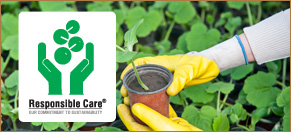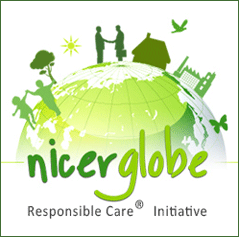


HYDERABAD - 22 NOVEMBER 2018
The CWC Help Desk of Indian Chemical Council (ICC) with the support of the National Authority, Chemical Weapon Convention (NACWC), Cabinet Secretariat, Govt. of India, organized an awareness programme on implementation of Chemical Weapons Convention Act - 2000 (CWC Act 2000) on the 22nd of November 2018 at Hotel Minerva Grand, Hyderabad. The programme was attended by 38 participants.
The main objective of conducting the programme was to create an awareness and understanding of the Chemical Weapons Convention (CWC), the importance of CWC Act-2000 and its relevance to the chemical industry. The other major objective was to highlight the steps regarding Digital Signature Certificate (DSC) which has been introduced in E-filing to authenticate the Annual Declaration process, from this year. It was successfully launched during Annual Declaration of Anticipated Activities (ADAA - 2019) and will be continued here after for annual declarations.
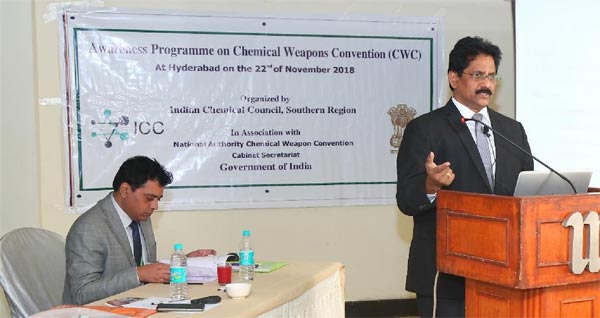
DR. R. NARAYANAN MAKING THE PRESENTATIONS ON CWC. SEATED IS DR. VIKASH AGRAWAL, FROM NACWC, GOVT OF INDIA.
The welcome address was given by Mr.V.Gireesan, CWC Help Desk Hyderabad. He welcomed the participants, read out the programme details and gave an overview about the programme.
Dr. R. Narayanan, In-Charge, CWC Help Desk - Southern Region, started with his presentations pertaining to the CWC Act 2000 and its implementation in India, Verification Regime, Role of National Authority, Online declarations and Digital Signature Certificate ( DSC).
Dr. Narayanan gave a quick overview about the CWC and the significance of CWC Act 2000. He talked about the weapons of mass destruction, how cruel the Chemical Weapons could be to the mankind. Then he gave an overview about the destruction of Chemical Weapons and how OPCW carries out verification of declarations submitted by the industries through inspection.
In between the presentations several video clippings were shown, which were pertaining to the functioning of OPCW and mock inspections.
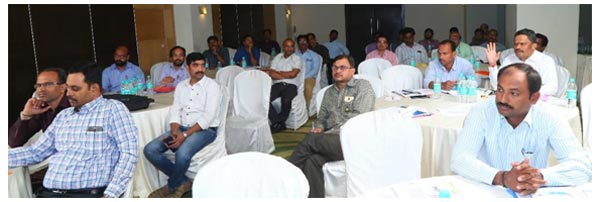
A SECTION OF THE DELEGATES
Followed by the CWC presentation, a presentation on the Verification Regime was also given. He talked about the threshold levels and explained about using an algorithm by the OPCW for the selection of industries for inspection. He cleared the apprehension about the inspection from the mind of the participants by explaining to them that the declarations do not always end up in inspections and explained about the threshold levels in detail. He also talked in detail about the roles and responsibilities of National Authority. The penalty clauses were highlighted and the potential declarants were encouraged to submit the declarations at the earliest.
Then Dr. Narayanan gave a presentation on the Digital Signature Certificate (DSC) process, at what stage it is introduced in the E-filing, the Digital Key specifications, the browser details including the Java version to be used etc were explained step by step through a short presentation. Photographs of every step involved in the E-filing process was shown during this presentation. Then a live demo of E-filing was shown and demonstrated to the participants
Dr.Vikash Agrawal, NACWC who was present as an observer, explained about the updates on Digital Signature Certificate. He touched upon the significance of declaration to OPCW and explained about the selection of industries for inspection using an algorithm. He briefly talked about the Role of National Authority for the implementation CWC Act 2000 (NACWC) in India. He also stressed on the penal sections of the CWC Act 2000.
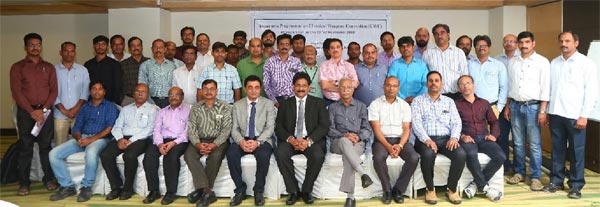
DELEGATES WITH THE FACULTY
With a short case study and interaction session the participants were made to understand the possibilities of where the mistakes could happen while submitting the declarations. A few participants from the industries who were inspected by OPCW were keen to understand the declaration mistakes and their doubts were clarified to them with similar examples.
Most of the participants were from pharmaceutical industries. There were a few traders who attended the programme. All the participants were quite happy with the way the programme was conducted which was reflected in their feedback. The programme ended with the vote of thanks followed by lunch. Mr. V. Gireesan co-ordinated very well with the activities connected with arranging the programme.
CHENNAI - 29 NOVEMBER 2018
The Indian Chemical Council (ICC) and the National Authority Chemical Weapon Convention, Cabinet Secretariat, Govt. of India jointly organized and conducted an awareness programme on "Chemical Weapons Convention" on the 29th of November 2018 at Hotel Savera, Chennai. The programme was attended by 42 participants.
The welcome address was given by Mr.S. Krishnamurthy, Secretary, ICC- Southern Region. He appreciated all the participants for their presence, read out the programme details and gave an overview about the programme.
Followed by the welcome address, Dr.R.Narayanan, In-Charge, CWC Help Desk - Hyderabad, welcomed Mr. Mukesh Kumar, NACWC who was present as an observer of the programme. Dr Narayanan gave a quick overview about the CWC and the significance of CWC Act 2000. He explained that the main objective of conducting the programme was to create an awareness and understanding of the Chemical Weapons Convention (CWC), the importance of the CWC Act-2000 and its relevance to the chemical industry. He added that the other major objective was the importance of e-filing of error-free CWC declarations, Digital Signature Certificate which is a mandatory part of E-filing, and discussion on the issues faced by the declarants.
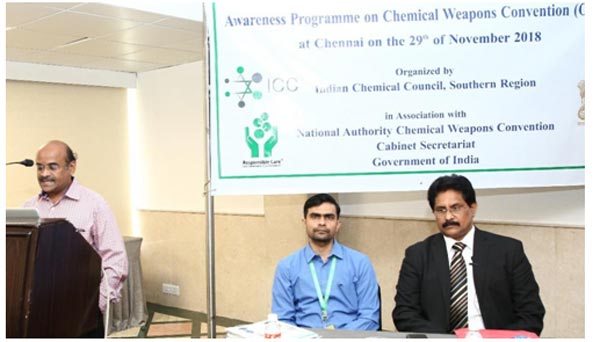
MR. V. GIREESAN, CWC HELPDESK-HYDERBAD ADDRESSING THE DELEGATES. SEATED ARE: MR. MUKESH KUMAR (NACWC, GOVT. OF INDIA) AND DR. R. NARAYAN.
Dr. Narayanan started with the presentation on the Chemical Weapons Convention (CWC). He explained about the CWC Act 2000, its implementation in India, stipulations laid down by the act, various Schedules of Chemicals, Discrete Organic Chemicals, declaration and verification thresholds. Dr. Narayanan talked about the need for declaration by the industries to the National Authority. He explained about the terms involved in the declaration process with examples.
Followed by the CWC presentation, a presentation on the Verification Regime of OPCW was also given by Dr. Narayanan. He talked about the threshold levels and the basis in which the industries are chosen for inspection and explained about using an algorithm by the OPCW for the selection of industries for inspection. He took them into confidence, by explaining to them that declaration does not always end up in inspection and explained about the threshold levels in detail.
Dr. Narayanan briefly talked about the Role of National Authority for the implementation CWC Act 2000 in India. He also explained about the need for declaration and also stressed on the penal sections of the CWC Act 2000.
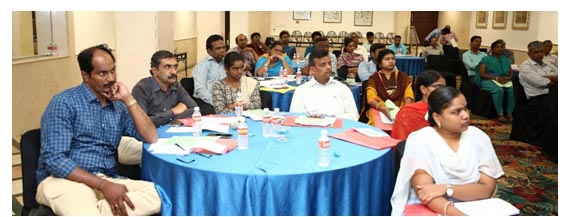
A PART VIEW OF THE DELEGATES
Dr. Narayanan explained about the introduction of Digital Signature Certificate (DSC) for ADAA 2019 and ADPA 2018. He added that ADAA 2019 was quite successful and the declarants were happy with the procedure. He gave a presentation on the Digital Signature Certificate (DSC) process, and explained the steps involved. He talked about the Digital Key specifications, the browser details including the Java version to be used. A live demo of E filing was shown.
After the presentations, during the interactive session, one of the participants was requested to explain about the conduct of inspections by the OPCW team. This participant belonged to the unit which was inspected by the OPCW team. He gave a very positive note about the overall experience and explained the process of inspection. This boosted the confidence of the rest of the participants who were present during the awareness programme.
The participants asked a lot of questions in the interactive session. A few case studies were conducted to test the understanding of the participants. Most of the participants answered very well. The participants were quite impressed with the way the programme was conducted which was reflected in their feedback.
The programme was attended by 42 participants. The participants were from various departments of the industries like Production, Planning, Environment, Safety and Health, which showed a commitment by these industries. Our constant persuasion of all the industries really helped for increasing the number of participants.
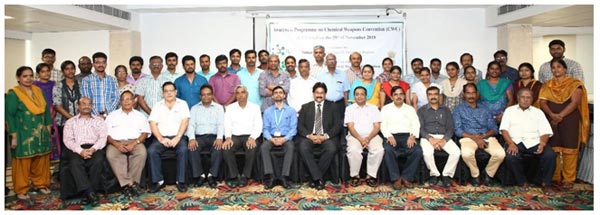
DELEGATES AT THE CHENNAI PROGRAM WITH FACULTY
Some students from the Chemical Engineering department of Anna University were also invited for the Awareness Programme. The idea was to share the knowledge about the Chemical Weapons Convention among the students fraternity which is very important for the future. The students were very attentive during the programme and were quite enthusiastic during the interactive session.
The programme ended with the vote of thanks followed by lunch.
